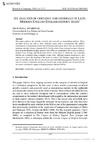Please use this identifier to cite or link to this item:
https://accedacris.ulpgc.es/jspui/handle/10553/57150
| DC Field | Value | Language |
|---|---|---|
| dc.contributor.author | Álvarez Gil, Francisco José | en_US |
| dc.date.accessioned | 2019-10-17T10:53:31Z | - |
| dc.date.available | 2019-10-17T10:53:31Z | - |
| dc.date.issued | 2019 | en_US |
| dc.identifier.issn | 2083-4616 | en_US |
| dc.identifier.uri | https://accedacris.ulpgc.es/handle/10553/57150 | - |
| dc.description.abstract | This paper analyses the adverbs certainly and generally as stancetaking markers. These adverbial devices are said to show authorial stance and to communicate the author’s commitment or detachment towards the information presented, and so they are classified as epistemic adverbs (Alonso-Almeida 2015). For this study, I have selected a corpus of history texts from the Modern English period (1700-1900), as compiled in The Corpus of History English Texts (Crespo and Moskowich 2015), on the basis of which the two evidential adverbs are examined using computer corpus tools, although manual inspection is also employed to assess the meaning of the items in context. The findings suggest that, in this type of scientific articles, the two adverbs are used with differing pragmatic functions, in the case of certainly it functions mostly as a booster and, in the specific case of generally, its use seems to primarily suggest a hedging purpose (Hyland 2005a). | en_US |
| dc.language | eng | en_US |
| dc.relation.ispartof | Research in Language | en_US |
| dc.source | Research in Language [ISSN 2083-4616], v. 17 (2), p. 179-195 | en_US |
| dc.subject | 5701 Lingüística aplicada | en_US |
| dc.subject | 5702 Lingüística diacrónica | en_US |
| dc.subject.other | Evidentiality | en_US |
| dc.subject.other | Epistemic modality | en_US |
| dc.subject.other | Stance | en_US |
| dc.subject.other | Adverbs | en_US |
| dc.subject.other | Corpus linguistics | en_US |
| dc.title | An analysis of certainly and generally in Late-Modern English English history texts | en_US |
| dc.type | info:eu-repo/semantics/article | en_US |
| dc.type | Article | en_US |
| dc.identifier.doi | 10.2478/rela-2019-0011 | |
| dc.identifier.scopus | 85068475541 | |
| dc.contributor.authorscopusid | 57204183086 | |
| dc.investigacion | Artes y Humanidades | en_US |
| dc.type2 | Artículo | en_US |
| dc.identifier.ulpgc | Sí | es |
| dc.description.sjr | 0,138 | |
| dc.description.sjrq | Q3 | |
| dc.description.erihplus | ERIH PLUS | |
| item.fulltext | Con texto completo | - |
| item.grantfulltext | open | - |
| crisitem.author.dept | GIR Discourse, Communication and Society | - |
| crisitem.author.dept | Departamento de Filología Moderna, Traducción e Interpretación | - |
| crisitem.author.orcid | 0000-0002-8752-9091 | - |
| crisitem.author.parentorg | Departamento de Filología Moderna, Traducción e Interpretación | - |
| crisitem.author.fullName | Álvarez Gil, Francisco José | - |
| Appears in Collections: | Artículos | |
SCOPUSTM
Citations
1
checked on Jun 8, 2025
Page view(s) 10
97
checked on Jan 10, 2026
Download(s)
96
checked on Jan 10, 2026
Google ScholarTM
Check
Altmetric
Share
Export metadata
Items in accedaCRIS are protected by copyright, with all rights reserved, unless otherwise indicated.
